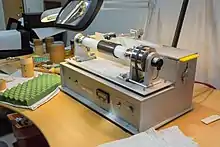Archéophone
The Archéophone is a modern, electric version of the phonographs and ediphones from the 19th and early 20th century. It is specifically designed to transfer phonograph cylinders and other cylinder formats to modern recording media.[1][2]

Designed in France by Henri Chamoux, the machine is used to transfer and preserve recordings at The Library of Congress, the Bibliothèque Nationale de France, Edison National Historic Site,[3] UC Santa Barbara,[4] University of North Carolina,[5] University College Dublin,[6] the Canadian Museum of Civilization and many other libraries and archives. Weighing almost 25 kg and costing over US $30,000, the Archéophone is a specialist's tool and not available to the general public. However, CDs with transferred cylinder recordings have been made available by various record labels and organizations.
References
- "Nauck's Resource Catalog: Archeophone". 65.36.235.139. Archived from the original on 23 May 2006. Retrieved 6 June 2022.
- Nationalbiblioteksområdet, in Statsbiblioteket, Aarhus, Denmark. April 2004, vol2, p. 11.
- Revue du Musée des Arts et Métiers, June 1999
- http://www-stage.library.ucsb.edu/special-collections/performing-arts/pastudio
- "Endeavors > spring 2001". Archived from the original on 2009-07-20. Retrieved 2009-04-26.
- "Les cylindres irlandais et bretons de l'University College Dublin".